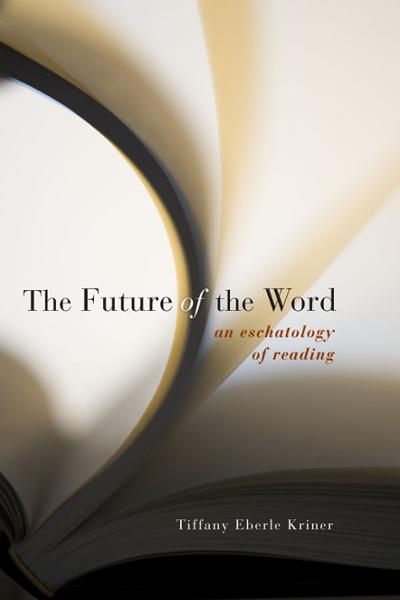In scripture, Jesus promises a future that potentially infuses all texts: “my words will not pass away” (Matt 24:35). This book argues that texts—even literary texts—, have an eschatology, too, a part in God’s purpose for the cosmos. They, with all creation, move toward participation in the new creation, in the Trinity’s expanding, creative love. This eschatological future for texts impacts how we understand meaning making, from the level of semiology to that of hermeneutics.
This book tells the story of how readers participate in the future of the word, the eschatology of texts. If texts have a future in the kingdom of God, then readers’ engagements with them—everything from preservation and utterance to translation, criticism, and call and response—can cultivate those futures in the love of the Trinity. Kriner explores how the fallenness and failures of texts, alongside readers’ own failures, while seeming to challenge the future of the word, ultimately point to reading as a posture of reconciliation, in which reader and text meet in the Maranatha of all text.
- Publisher Fortress Press
- Format Paperback
- ISBN 9781451470321
- eBook ISBN 9781451487657
- Dimensions 6 x 9
- Pages 224
- Publication Date July 1, 2014
Endorsements
—Thomas Gardner
Virginia Tech
"This is an impressively conceived and well-researched study of the intricate ways in which texts participate in the future of God's promise—or fail to participate. The Future of the Word draws deeply from theology, literary and cultural theory and criticism, and contemporary events and pop culture to show how our world is shot through with the hope, including the productions of so-called secular authors. Perhaps the most exciting element of this study is its convincing account of the way literary works, and our acts of reading and interpreting them, should be envisioned as a participation in the unfolding of God's hope and promise for the entire creation. As such, the 'future of words' becomes a profoundly sacred and mindful activity, one in which we are all called to contribute as worthy 'scribes' trained in God's eschatological purposes. The sheer scope of the research is impressive; but even more impressive is the user-friendly prose in which the author conveys difficult theoretical and theological concepts—it is challenging yet highly readable, and overall is a bracing, elevating, and edifying reading experience."
—Harold K. Bush
Saint Louis University
"This wonderful book should be read by anyone interested in the relationship between religion and literature. It provides a compelling account of how literary texts and our reading of them can be understood eschatologically, and it offers an extremely rich and sensitive exploration of the theological ethics of reading. Tiffany Eberle Kriner writes clearly and is a theoretically and theologically astute guide. Her willingness to take on difficult questions and challenging texts is admirable, as is the attentive and discerning way in which she interprets a wide range of material from the literary and theological traditions."
—Mark Knight
University of Toronto
"In a period where many question the value of reading, studying, and writing about literature, Tiffany Eberle Kriner has written a timely book on the continuing value of both literature and reading. The fundamental question that Kriner’s book poses for readers is not an instrumental question regarding what literature can do for us, nor is it an ideological question regarding what literature has done to us. Rather, for Kriner, the fundamental question is what we as readers can do for texts, our reading itself being a part of the ongoing redemption, resurrection, and reconciliation of the word."
—Peter Kerry Powers
Messiah College
"Offering a scintillating synthesis of theology and literary criticism, this book demonstrates how the pleasures and perils of reading advance the kingdom of God. Combining astute research with personal anecdote, profound insight with delightful wordplay, Kriner practices what she preaches, reading not only scripture and scholarship but also poetry and prose with 'response-ability.' Much as medieval transcribers of Bible codices preserved God’s word with illuminations that changed the word's textual effect, Kriner illuminates the changing power of texts by painting us, as readers, onto the pages we read, such that our interpretations participate in hope for the word to come."
—Crystal Downing
Messiah College
Samples
Reviews
Review in Literature and Theology, Oxford University Press
